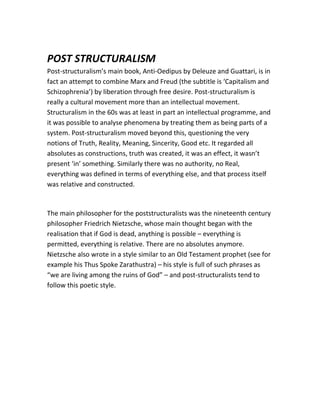Post structuralism
- 1. POST STRUCTURALISM Post-structuralismâs main book, Anti-Oedipus by Deleuze and Guattari, is in fact an attempt to combine Marx and Freud (the subtitle is âCapitalism and Schizophreniaâ) by liberation through free desire. Post-structuralism is really a cultural movement more than an intellectual movement. Structuralism in the 60s was at least in part an intellectual programme, and it was possible to analyse phenomena by treating them as being parts of a system. Post-structuralism moved beyond this, questioning the very notions of Truth, Reality, Meaning, Sincerity, Good etc. It regarded all absolutes as constructions, truth was created, it was an effect, it wasnât present âinâ something. Similarly there was no authority, no Real, everything was defined in terms of everything else, and that process itself was relative and constructed. The main philosopher for the poststructuralists was the nineteenth century philosopher Friedrich Nietzsche, whose main thought began with the realisation that if God is dead, anything is possible â everything is permitted, everything is relative. There are no absolutes anymore. Nietzsche also wrote in a style similar to an Old Testament prophet (see for example his Thus Spoke Zarathustra) â his style is full of such phrases as âwe are living among the ruins of Godâ â and post-structuralists tend to follow this poetic style.

